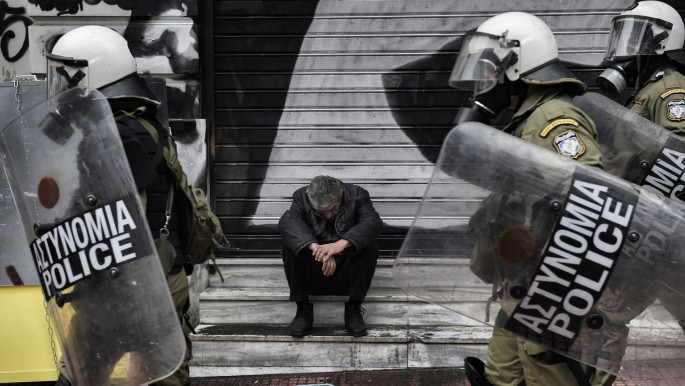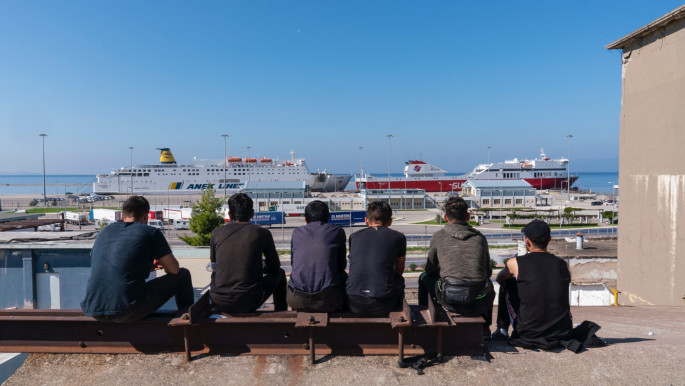Golden Dawn: The fall of Greece's neo-Nazi party
Striking public workers and migrant rights groups mixed with students and anarchists as people ate chips and grilled meat and the anti-fascist anthem 'Bella Ciao' was blasted from loudspeakers above.
After five and a half years, a mammoth trial that had collected evidence of two murders, an attempted kidnapping and a plethora of street-level racist violence was about to conclude.
The verdict would decide whether the far-right Golden Dawn party was responsible in the eyes of the law, and most importantly, whether it would be classified as a criminal organisation.
At just past 11.30am, Magda Fyssas, the mother of murdered anti-fascist activist Pavlos Fyssas, walked out of the courtroom. The crowd applauded and embraced as jubilant chants of "Nazis out!" filled the air. "You did it, my son!" Magda Fyssas shouted. Golden Dawn had been condemned.
The rise of Golden Dawn
The roots of Golden Dawn go back to 1979, when a dismissed soldier named Nikolaos Michaloliakos met the former generals of the ousted right-wing junta in prison.
There, the disgraced ex-leaders convinced Michaloliakos to start a political party that would return Greece to a right-wing dictatorship. The 2003 Iraq war and subsequent rising Islamophobia in Europe focused Golden Dawn's violent actions on the country's Muslim population, but until 2010, the party remained relatively fringe.
 |
The roots of Golden Dawn go back to 1979, when a dismissed soldier named Nikolaos Michaloliakos met the former generals of the ousted right-wing junta in prison |  |
Petros Konstandinou co-ordinates Keerfa, an anti-racist group, and has been organising against fascists in Greece since the 1990s. "It all changed after the recession hit in 2008. As the crisis worsened, people began to criticise the economic and political system that was failing them," Konstandinou tells The New Arab.
This produced fear and uncertainty in many of Greece's political institutions, particularly those on the right who now found themselves with a dramatically smaller representation in parliament. Mainstream right-wing press outlets began to host representatives from Golden Dawn, treating them with respect as a normal political party.
 |
|
| Read more: Moria camp tragedy is a wake-up call for Europe's failed migration policy |
"For those in power, Golden Dawn represented less of a threat than the other fringe parties who were gaining power, like Syriza. Golden Dawn directed the public anger away from the economic elite and towards those who already had little power: the migrants," argues Konstandinou.
Golden Dawn's message was publicly cleaned of its explicitly violent rhetoric and presented itself as the party of Greek patriotism. Amongst upheaval it found success; in 2010 Golden Dawn won a seat on the Athens City Council, and in 2012 eighteen Golden Dawn candidates were elected to parliament.
In parliament, they continued pursuing the policies they fought for on the streets; closed borders and a militarised police force, and for the exclusion of refugees and migrants.
Paramilitary battalions
Throughout their time of parliamentary success, street violence remained key to Golden Dawn's success. It is now public knowledge that in the working-class neighbourhoods where they won votes they operated extensive paramilitary battalions that fought their political foes. They patrolled streets at night, physically attacked refugees and migrants, as well as anyone perceived as an anti-fascist.
 |
Golden Dawn directed public anger away from the economic elite and towards those who already had little power: migrants |  |
Omaira Gill, an Athenian from a migrant background describes hearing about the attacks in her community. "People were beaten within an inch of their lives. You wondered when this hatred would come knocking on your door. You didn't feel safe." she tweeted. "It became difficult to move around at night," remembers Konstandinou.
For many, police collusion felt omnipresent, and Golden Dawn appeared to have support from the institution. After the 2012 elections, several Greek newspapers and television stations estimated that more than 50 percent of special service police officers in Athens voted for the neo-Nazi party.
The murders of Pavlos Fyssas and Shehzad Luqman
In the cold early winter months of 2013, an Athenian migrant named Shehzad Luqman was returning home from work. In the Golden Dawn heartland of Piraeus, a battalion attacked him. Luqman was dragged from his bike and murdered. The killer was arrested by the police, but the party remained active in parliament and in the neighbourhoods.
Then in September, the Piraeus battalion organised another murder, this time of 32-year-old anti-fascist rapper Pavlos Fyssas. Even though witnesses saw police present, no arrests were made.
Fyssas' now famous murder proved to be the turning point. For many, the murder demonstrated the long-suspected collusion between the neo-Nazi party and some factions of the police. Over 10,000 Greeks demonstrated outside the Greek Parliament in Athens, and the investigation into Golden Dawn's violent tactics was finally set in motion.
 |
|
| Read more: Refugee groups fearful as Greek government brings back dictatorship-era anti-protest law |
Organised resistance
Konstandinou suggests that whilst last week's verdict is momentous, it was in the localised response to Golden Dawn that the group was first defeated.
Anti-fascists groups, armed with helmets and wooden sticks, set up night patrols to defend their communities, including migrants and refugees, from the attacks of the Golden Dawn battalions.
One refugee living in central Athens in 2015 who prefers to remain anonymous described the spirit of resistance. "Golden Dawn motivated people to attack us with Islamophobia and racism," she tells The New Arab. "But after they killed Fysass, we came together with more people than they could ever bring".
Groups like Keerfa spearheaded a mass inclusive workers movement. The group builds solidarity between migrant groups, newly arrived refugees and other Greeks. They targeted every Golden Dawn mobilisation, drowning anti-migrant slogans with their own chants of inclusion and anti-racism.
"A fascist party needs street fighting to survive - they need to look strong locally," says Konstandinou. "With our actions, we shut down their community activities, and worked together to end the violence. By doing this, we destroyed their appeal".
 |
Those of us who have been fighting these fascists are very proud. It's the biggest political victory in Greece since the fall of the dictatorship |  |
What next?
In the 2019 elections, Golden Dawn failed to gain the 3 percent vote threshold needed to gain seats in parliament. Last week's verdict sees it banned as a criminal organisation for good, and much of its core leadership jailed. It is likely to be the final nail in the coffin for Golden Dawn.
However, the politics that Golden Dawn practised are far from defeated. Their presence on the streets and in parliament introduced a number of racist, anti-migrant policies into the realm of the acceptable.
 |
|
| Read more: The city where young migrants risk everything to escape Greece's immigration nightmare |
2020 has seen an escalation of police violence and dictatorship-era anti-protest laws re-introduced. Organised fascist groups patrol the island of Lesbos where 8,000 refugees still shelter; and techniques of deterrence and containment guide the new right-wing governments' migration policy.
As people cheered outside the courthouse following the decision, police responded to the throwing of a water bottle with military-style violence. Choking grenades of tear gas were used to attempt to disperse the celebrating crowd.
"Slowly, slowly!" protesters called to one another as people struggled to guide the older and more vulnerable out of the line of fire. But as people marched away from tear gas and water cannons, fists remained in the air, and chants soared over the noise of the grenades. The protesters regrouped a few kilometres away and marched on to Parliament.
"Those of us who have been fighting these fascists are very proud," says Konstandinou. "It's the biggest political victory in Greece since the fall of the dictatorship. There is an alternative to racism and hatred; the message is clear."
Keira Dignan is a freelance journalist and librarian based in Athens, Greece
Follow her on Twitter: @DignanKeira





 Follow the Middle East's top stories in English at The New Arab on Google News
Follow the Middle East's top stories in English at The New Arab on Google News


